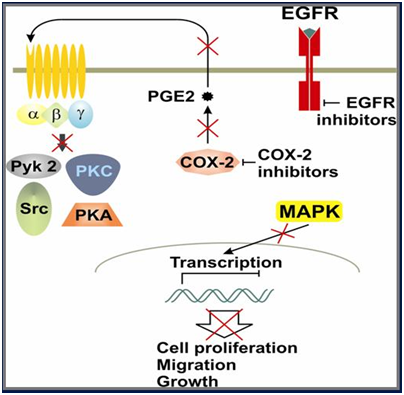COX2

Cyclooxygenase (COX) is an enzyme that is responsible for the formation of prostanoids.The three main groups of prostanoids-prostaglandins, prostacyclins, and thromboxanes are each involved in the inflammatory response.COX-2 is undetectable in most normal tissues.It is an inducible enzyme, becoming abundant in activated macrophages and other cells at sites of inflammation.More recently, it has been shown to be upregulated in various carcinomas and to have a central role in tumorigenesis.
COX-2 appears to be related to cancers and abnormal growths in the intestinal tract.COX inhibitors have been shown to reduce the occurrence of cancers and pre-cancerous growths.The National Cancer Institute has done some studies on COX-2 and Cancer.And the FDA has approved Celebrex for treatment of familial adenomatous polyposis (FAP).COX-2 inhibitors are currently being studied in breast cancer and appear to be beneficial.
Recent studies have shown that small tumors of the sympathetic nervous system (neuroblastoma) have abnormal levels of COX-2 expressed.These studies report that overexpression of the COX-2 enzyme has an adverse effect on the tumor suppressor p53. p53 is an apoptosis transcription factor normally found in the cytosol.When cellular DNA is damaged beyond repair, p53 is transported to the nucleus where it promotes p53 mediated apoptosis.Two of the metabolites of COX-2, prostaglandin A2 (PGA2) and A1 (PGA1), when present in high quantities bind to p53 in the cytosol and inhibit its ability to cross into the nucleus.This essentially sequesters p53 in the cytosol and prevents apoptosis.Coxibs such as Celebrex (celecoxib),by selectively inhibiting the overexpressed COX-2,allow p53 to work properly.Functional p53 allows DNA damaged neuroblastoma cells to commit suicide through apoptosis,halting tumor growth.


